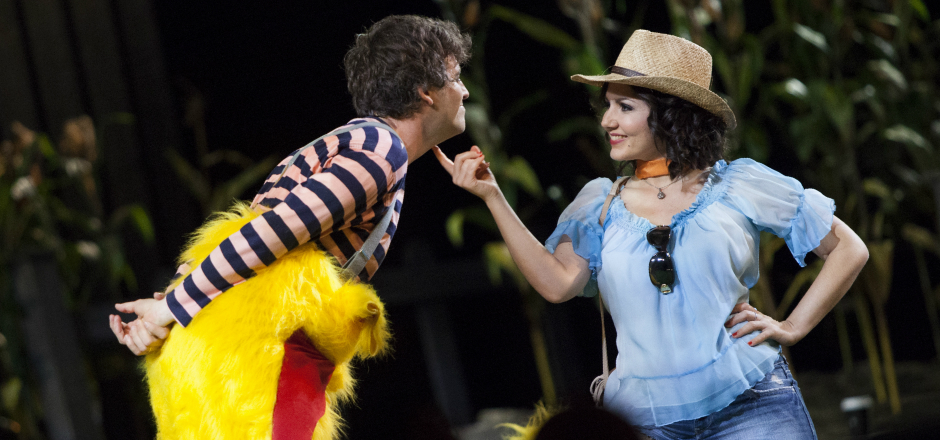Lyric Season 2017/18
Opera Repertoire
L'elisir d'amore
Gaetano Donizetti
L'elisir d'amore
An opera in two acts
Libretto by Felice Romani
Music by Gaetano Donizetti
First performed: 12 May 1832 at the Teatro della Cannobiana, Milan
Staged by the Maggio Musicale Fiorentino
Artists
Conductor
Fabrizio Maria Carminati
Direction
Pier Francesco Maestrini
Scenes
Juan Guillermo Nova
Costumes
Luca Dall’Alpi
Light design
Bruno Ciulli
Choir director
Lorenzo Fratini
Orchestra and Choir of the Maggio Musicale Fiorentino
Fabrizio Maria Carminati
Direction
Pier Francesco Maestrini
Scenes
Juan Guillermo Nova
Costumes
Luca Dall’Alpi
Light design
Bruno Ciulli
Choir director
Lorenzo Fratini
Orchestra and Choir of the Maggio Musicale Fiorentino
Adina
Mihaela Marcu
Nemorino
Juan Francisco Gatell
Dulcamara
Fabrizio Beggi
Giannetta
Giulia Bolcato
Belcore
Marco Bussi
Mihaela Marcu
Nemorino
Juan Francisco Gatell
Dulcamara
Fabrizio Beggi
Giannetta
Giulia Bolcato
Belcore
Marco Bussi
Exhausted by working the fields, the harvesters and the peasant Giannetta rest at the entrance to Adina’s farm; the latter is reading to one side while the shy Nemorino, who is in love with her, watches from afar. A drum roll announces the arrival of a squadron of soldiers captained by Belcore, a sergeant who is so bold he immediately asks for the hand of Adina. The girl plays for time and tells Nemorino, who once again declares all his love, that she is too fickle to be tied to just one man. A short while later, Doctor Dulcamara arrives in the village, selling a miraculous elixir which can heal any illness. The gullible Nemorino takes this opportunity to ask for a potion which would win him the love of Adina, but Dulcamara, who in reality is a charlatan, sells him a simple bordeaux, promising him the most amazing of effects after just one day. Having drunk the wine, and sure of his success, Nemorino begins to treat Adina in a condescending manner. The young woman, irritated by this new behaviour, decides to marry Belcore that same evening. Nemorino, desperate, pleads uselessly for his loved one to postpone the wedding to the next day, when the elixir will finally take effect.
ACT II
At the farm, celebrations are under way for the wedding. Nemorino, hoping to accelerate the effects of the elixir, wants to buy another bottle: as he doesn't have the money, he is forced to accept the advice which Belcore wastes no time in giving: sign up as a soldier and earn twenty escudos. In the meantime, the peasant women, hearing of the death of Nemorino’s uncle and the immense fortune bequeathed to his nephew, begin to court the boy, rousing Adina’s jealousy. Finally the young woman realises she is in love with Nemorino and, after having liquidated the conscription contract, declares her love. Belcore therefore has no choice but to continue his journey with his garrison, while Dulcamara attributes the happy ending to the formidable effects of his elixir.
Nasce a Bergamo il 29 novembre 1797. Di umili origini, riceve i primi insegnamenti musicali alle Lezioni Caritatevoli di Musica di Giovanni Simone Mayr. Dopo un periodo di perfezionamento al Liceo Musicale di Bologna, esordisce nel 1818 con Enrico di Borgogna, per la riapertura del Teatro San Luca di Venezia. Nel 1822 diviene direttore del Teatro San Carlo di Napoli, ruolo che deterrà fino al 1833. Sono anni di frenetica attività compositiva, testimoniati da capolavori come Anna Bolena (1830), L’elisir d’amore (1832), Lucrezia Borgia (1833), Lucia di Lammermoor (1835), Maria Stuarda (1835), Roberto Devereux(1837). Nel 1835 Gioachino Rossini lo invita a Parigi, dove debutta al Théâtre Italien con Marin Faliero: è la consacrazione internazionale e l’inizio del prolifico legame con la capitale francese per cui compone anche La Fille du régiment (1840) e Don Pasquale (1843). L’8 aprile 1848, reso folle dalla sifilide, muore a Bergamo.
